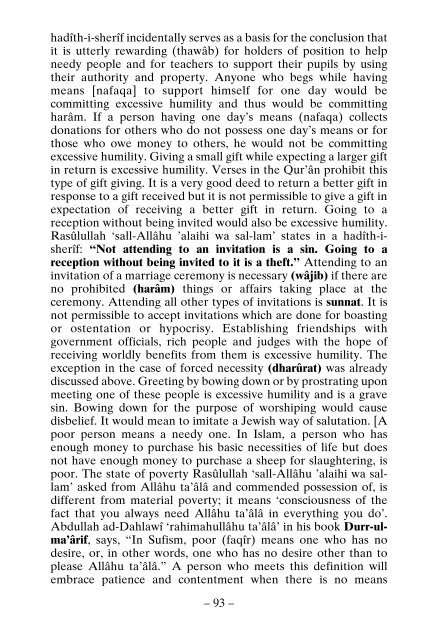Ethics of Islam
Ethics of Islam is taken from the book Berîka by Muhammad Hâdimi. Immorality and ways to get rid of it; 40 depravities and cures to them; usefulness of ethics; what is a soul; strengths of a soul; Personalities emanating from wisdom, courage, chastity and justice are extensively explained.
Ethics of Islam is taken from the book Berîka by Muhammad Hâdimi. Immorality and ways to get rid of it; 40 depravities and cures to them; usefulness of ethics; what is a soul; strengths of a soul; Personalities emanating from wisdom, courage, chastity and justice are extensively explained.
You also want an ePaper? Increase the reach of your titles
YUMPU automatically turns print PDFs into web optimized ePapers that Google loves.
hadîth-i-sherîf incidentally serves as a basis for the conclusion that<br />
it is utterly rewarding (thawâb) for holders <strong>of</strong> position to help<br />
needy people and for teachers to support their pupils by using<br />
their authority and property. Anyone who begs while having<br />
means [nafaqa] to support himself for one day would be<br />
committing excessive humility and thus would be committing<br />
harâm. If a person having one day’s means (nafaqa) collects<br />
donations for others who do not possess one day’s means or for<br />
those who owe money to others, he would not be committing<br />
excessive humility. Giving a small gift while expecting a larger gift<br />
in return is excessive humility. Verses in the Qur’ân prohibit this<br />
type <strong>of</strong> gift giving. It is a very good deed to return a better gift in<br />
response to a gift received but it is not permissible to give a gift in<br />
expectation <strong>of</strong> receiving a better gift in return. Going to a<br />
reception without being invited would also be excessive humility.<br />
Rasûlullah ‘sall-Allâhu ’alaihi wa sal-lam’ states in a hadîth-isherîf:<br />
“Not attending to an invitation is a sin. Going to a<br />
reception without being invited to it is a theft.” Attending to an<br />
invitation <strong>of</strong> a marriage ceremony is necessary (wâjib) if there are<br />
no prohibited (harâm) things or affairs taking place at the<br />
ceremony. Attending all other types <strong>of</strong> invitations is sunnat. It is<br />
not permissible to accept invitations which are done for boasting<br />
or ostentation or hypocrisy. Establishing friendships with<br />
government <strong>of</strong>ficials, rich people and judges with the hope <strong>of</strong><br />
receiving worldly benefits from them is excessive humility. The<br />
exception in the case <strong>of</strong> forced necessity (dharûrat) was already<br />
discussed above. Greeting by bowing down or by prostrating upon<br />
meeting one <strong>of</strong> these people is excessive humility and is a grave<br />
sin. Bowing down for the purpose <strong>of</strong> worshiping would cause<br />
disbelief. It would mean to imitate a Jewish way <strong>of</strong> salutation. [A<br />
poor person means a needy one. In <strong>Islam</strong>, a person who has<br />
enough money to purchase his basic necessities <strong>of</strong> life but does<br />
not have enough money to purchase a sheep for slaughtering, is<br />
poor. The state <strong>of</strong> poverty Rasûlullah ‘sall-Allâhu ’alaihi wa sallam’<br />
asked from Allâhu ta’âlâ and commended possession <strong>of</strong>, is<br />
different from material poverty; it means ‘consciousness <strong>of</strong> the<br />
fact that you always need Allâhu ta’âlâ in everything you do’.<br />
Abdullah ad-Dahlawî ‘rahimahullâhu ta’âlâ’ in his book Durr-ulma’ârif,<br />
says, “In Sufism, poor (faqîr) means one who has no<br />
desire, or, in other words, one who has no desire other than to<br />
please Allâhu ta’âlâ.” A person who meets this definition will<br />
embrace patience and contentment when there is no means<br />
– 93 –

















